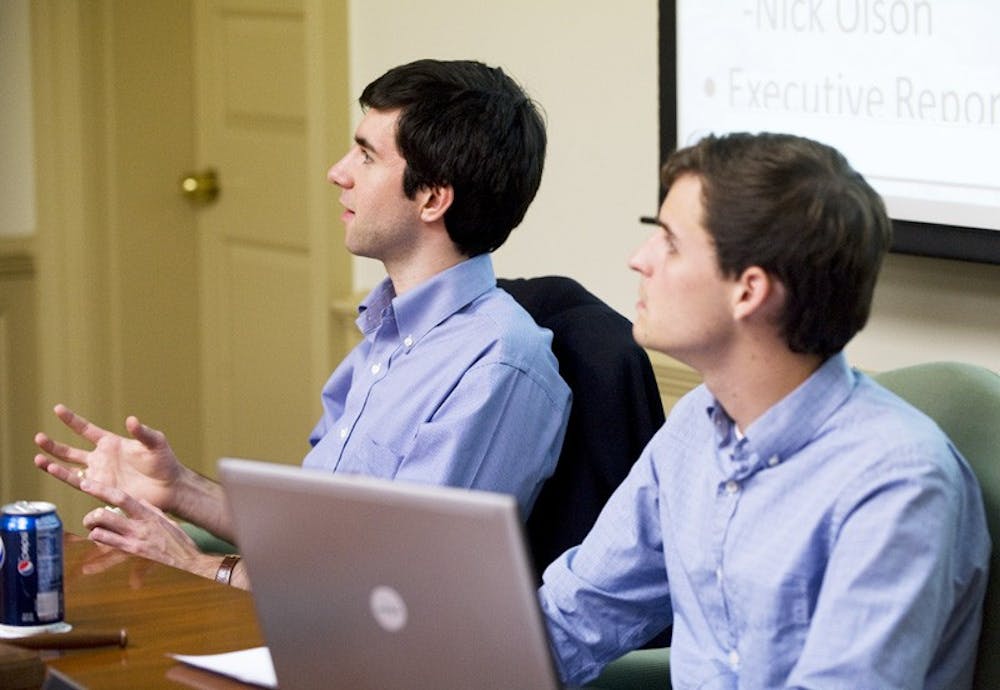Student Council members Tuesday night debated the Environmental Sustainability Committee's proposal to introduce a $5 Green Fee that would help fund sustainability projects. The fee will be presented as a University-wide election referendum in the spring.
"This is a small additional fee ... to generate more funds for explicit use on sustainability issues, or it'll be a redistribution of already existing funds," committee member Ian McClenny said. "It's a voluntary student-initiated fee, so students can opt out of it at the beginning of the semester."
McClenny noted that the funds will help the University meet its sustainability goals to be in line with other higher education institutions across the country.
"We want to improve the University's carbon footprint in the day-to-day operations," he said. "There are a number of schools that have initiated similar programs and we want to be in the forefront of this issue; We want to achieve our carbon reduction and sustainability goals at the University."
McClenny said the money also could fund grants proposed by members of the University community. A separate committee of students and possibly faculty members would oversee the administration of these grants.
"Students, faculty and staff can submit projects and ideas ... toward sustainable efforts that aren't covered by Facilities Management or the University," he said. "We're open to feedback about how we should allocate the money."
Fellow Committee member Halley Epstein emphasized the committee's intent to involve students in the process.
"We researched similar fees at 65 other institutions in the U.S. and Canada," she said. "We think that somewhere around $5 a semester would be [reasonable]. The alternative would be to redirect funds from the [Student Activities Fund] ... We could give more money to students with their own ideas."
She used solar panels as an example of a project that may not be funded by the University because of budget constraints but could go a long way toward contributing to the University's sustainability policies.
Council Vice President of Organizations Colin Hood, though, advised the committee to be especially careful in handling how the possible grants would be administered, especially if contracted independent organizations are eligible to apply. Diversity Initiatives Co-Chair Carrie Filipetti also expressed doubts about the proposed fee.
"My concern is that this becomes a hidden fee that students don't really know about," she said, adding that she prefers an opt-in program instead.
In response, Epstein noted that the proposal is still in its early stages and that the committee is still exploring its options.
"That's another thing we want to get feedback on - whether an opt-in program would be more beneficial," Epstein said. "We don't know how effective that will be necessarily ... But we don't want to impose any financial burden on students."
Committee Co-Chair Michelle Henry added that obtaining SAF resources would have other implications and would be subject to administrative oversight. Students interested in opting out would specifically have to state their reservations to be eligible for a refund.
"As with the SAF, you have to oppose what the people are doing with the money in order to receive that money back," Henry said. "You have to actually oppose what the project would be to receive the $5 back."
Filipetti said the charge also seems arbitrary.
"There are a lot of other committees here that I'm sure would love to charge students $5 to contribute to their budget," Filipetti said.
Henry said other Student Council committees could possibly use money from the fund.
"It's just a different mindset of thinking about how we're thinking about achieving initiatives in a sustainable way beyond a one-time event," Henry said. "It's to share the wealth and to think about our projects through a different lens."
Epstein noted that the spring referendum would simply be a gauge of student support for the Green Fee; University officials would have the final call.
In the meantime, Council President John Nelson stressed the importance of educating students about what the Green Fee would entail.
"If we're using this referendum and really want it to be a true gauge of what students think, it's really important that we educate people," he said, "because a lot of the time, you do get a lot of people who see $5 and who just say 'yes' and are clicking through really quickly, so thinking of the education part is going to be important."
Thus far, students have expressed mixed feelings about the potential change. Fourth-year College student Heejo Han, for example, does not consider the Green Fee to be a financial burden.
"I don't mind," he said. "It's just $5, so it's not a big deal."
Quyen Tran, also a fourth-year College student, does not support the idea.
"I don't think it's necessary because not everyone will be participating in the proposed projects," she said.
Athletic Affairs Committee Chair David Hondula said examining this kind of debate could prove beneficial to Council members.
"There's a high value in having this group and committee chairs debate," Hondula said. "If the Environmental Sustainability has to fight for that increase in spending of the SAF allocation each year, that would reaffirm that students are in line, every year, with increasing sustainable budgeting"







